- Home
- Quizzes
- My Quiz Activity
- Newsletters
- Sports Betting
- MY FAVORITES
- Add Sports/Teams
- SPORTS
-
NFL
- NFL Home
- Arizona Cardinals
- Atlanta Falcons
- Baltimore Ravens
- Buffalo Bills
- Carolina Panthers
- Chicago Bears
- Cincinnati Bengals
- Cleveland Browns
- Dallas Cowboys
- Denver Broncos
- Detroit Lions
- Green Bay Packers
- Houston Texans
- Indianapolis Colts
- Jacksonville Jaguars
- Kansas City Chiefs
- Las Vegas Raiders
- Los Angeles Chargers
- Los Angeles Rams
- Miami Dolphins
- Minnesota Vikings
- New England Patriots
- New Orleans Saints
- New York Jets
- New York Giants
- Philadelphia Eagles
- Pittsburgh Steelers
- San Francisco 49ers
- Seattle Seahawks
- Tampa Bay Buccaneers
- Tennessee Titans
- Washington Commanders
-
MLB
- MLB Home
- Arizona Diamondbacks
- Atlanta Braves
- Baltimore Orioles
- Boston Red Sox
- Chicago White Sox
- Chicago Cubs
- Cincinnati Reds
- Cleveland Guardians
- Colorado Rockies
- Detroit Tigers
- Houston Astros
- Kansas City Royals
- Los Angeles Angels
- Los Angeles Dodgers
- Miami Marlins
- Milwaukee Brewers
- Minnesota Twins
- New York Yankees
- New York Mets
- Oakland Athletics
- Philadelphia Phillies
- Pittsburgh Pirates
- San Diego Padres
- San Francisco Giants
- Seattle Mariners
- St. Louis Cardinals
- Tampa Bay Rays
- Texas Rangers
- Toronto Blue Jays
- Washington Nationals
-
NBA
- NBA Home
- Atlanta Hawks
- Boston Celtics
- Brooklyn Nets
- Charlotte Hornets
- Chicago Bulls
- Cleveland Cavaliers
- Dallas Mavericks
- Denver Nuggets
- Detroit Pistons
- Golden State Warriors
- Houston Rockets
- Indiana Pacers
- Los Angeles Clippers
- Los Angeles Lakers
- Memphis Grizzlies
- Miami Heat
- Milwaukee Bucks
- Minnesota Timberwolves
- New Orleans Pelicans
- New York Knicks
- Oklahoma City Thunder
- Orlando Magic
- Philadelphia 76ers
- Phoenix Suns
- Portland Trail Blazers
- Sacramento Kings
- San Antonio Spurs
- Toronto Raptors
- Utah Jazz
- Washington Wizards
-
NHL
- NHL Home
- Anaheim Ducks
- Arizona Coyotes
- Boston Bruins
- Buffalo Sabres
- Calgary Flames
- Carolina Hurricanes
- Chicago Blackhawks
- Colorado Avalanche
- Columbus Blue Jackets
- Dallas Stars
- Detroit Red Wings
- Edmonton Oilers
- Florida Panthers
- Los Angeles Kings
- Minnesota Wild
- Montreal Canadiens
- Nashville Predators
- New Jersey Devils
- New York Islanders
- New York Rangers
- Ottawa Senators
- Philadelphia Flyers
- Pittsburgh Penguins
- San Jose Sharks
- Seattle Kraken
- St. Louis Blues
- Tampa Bay Lightning
- Toronto Maple Leafs
- Vancouver Canucks
- Vegas Golden Knights
- Washington Capitals
- Winnipeg Jets
- NCAAF
- NCAAM
- Boxing
- Entertainment
- Lifestyle
- Golf
- MMA
- Soccer
- Tennis
- Wrestling
- More Sports
- RESOURCES
- My Account
- YB on Facebook
- YB on Twitter
- YB on Flipboard
- Contact Us
- Privacy Policy
- Terms of Service
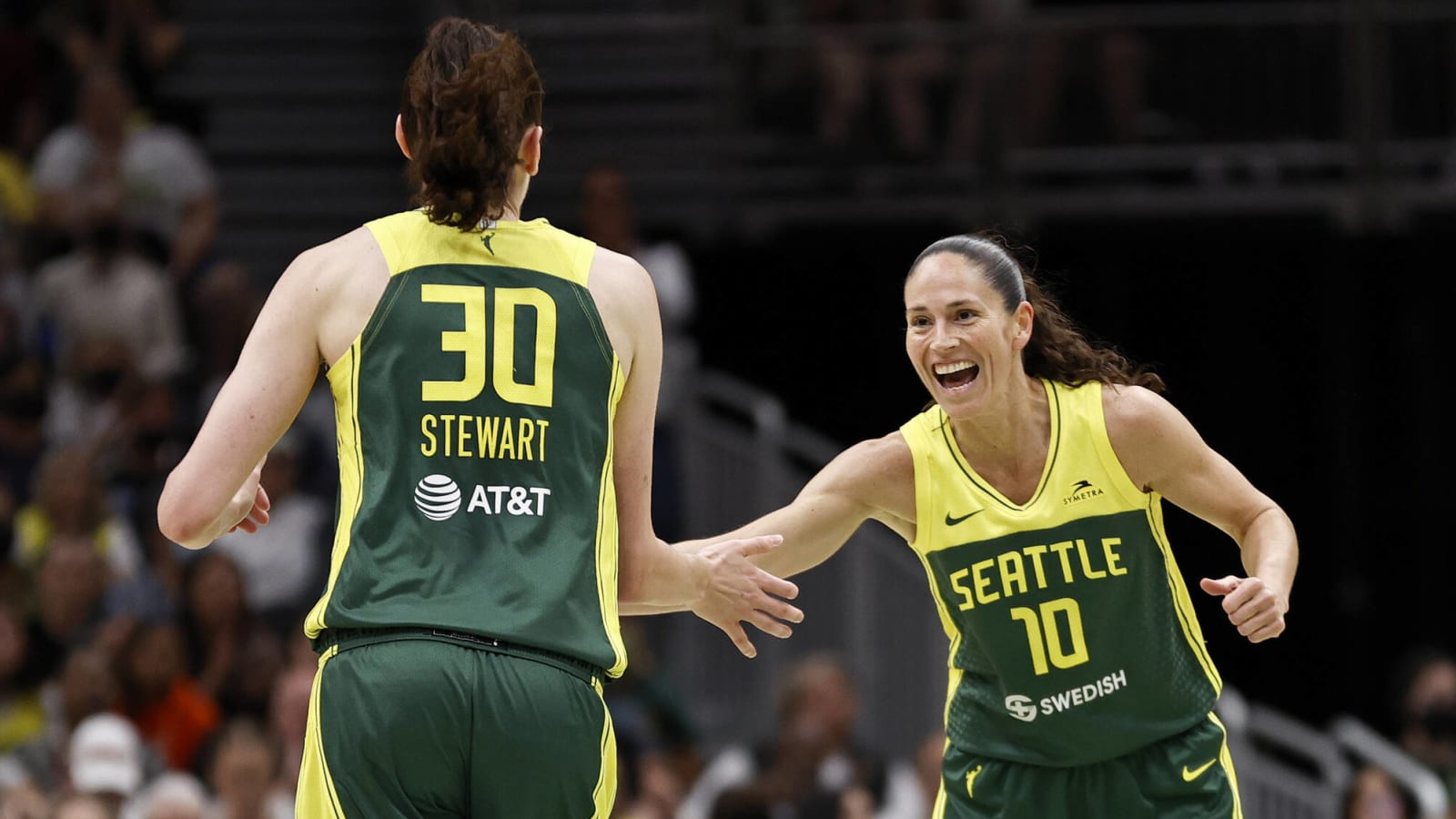
The greatest WNBA teams of all time
The WNBA has featured the best women's basketball players in the world during its illustrious history. Some of those players were part of memorable teams that defined the collective greatness of the league. Here are the 25 best teams in WNBA history, including some that didn't win it all.
25. Minnesota Lynx (2015)
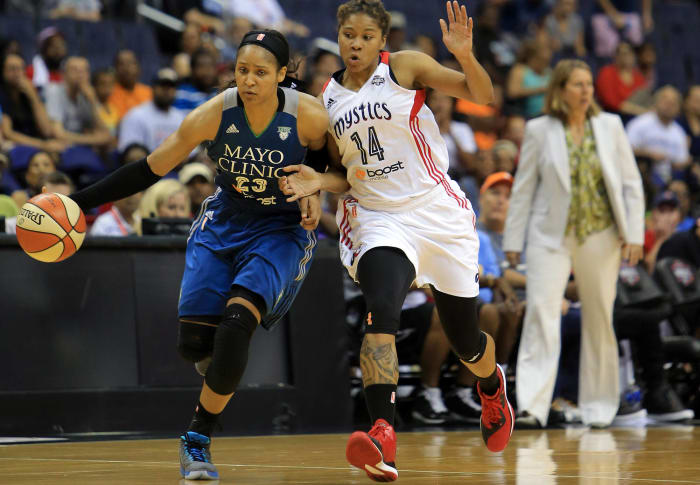
The third of Minnesota's four WNBA championship teams. Despite 12 regular-season losses, the Lynx finished atop the Western Conference and owned the league's second-best record at 22-12. Minnesota went 4-6 down the stretch but proved stout during the postseason, where it lost just three times and won three games by three or fewer points. Averaging 20.6 points, Maya Moore was named All-WNBA First Team. Meanwhile, Sylvia Fowles, who averaged 12.6 points and 9.7 rebounds during the postseason, earned Finals MVP honors.
24. Connecticut Sun (2021)
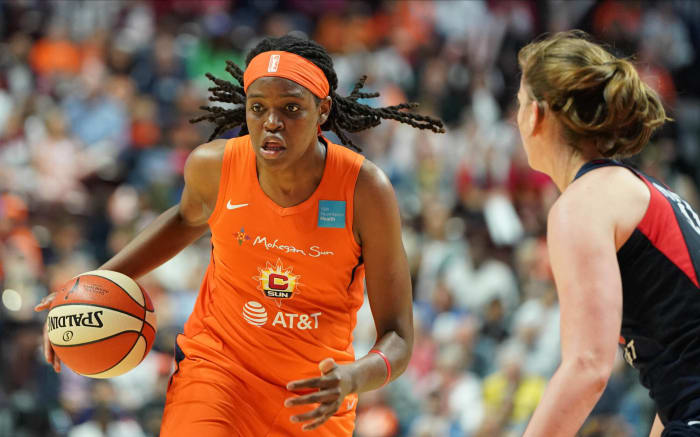
The Connecticut Sun franchise was established in 1999 while based in Orlando. However, it's still searching for that elusive first WNBA title. On three occasions (2004, '05, '19), the Sun reached the WNBA Finals, but the best team in club history — among the best in league history — could be one that didn't even get to that final series. In 2021, led by WNBA MVP Jonquel Jones (19.4 points, 11.2 rebounds per game), the Sun posted a league-best 26-6 mark for a franchise-high .813 winning percentage and took a 14-game winning streak into the playoffs. They ran into the eventual champion Chicago Sky, who upset the Sun in a four-game semifinal series. Connecticut's three losses in that series came by a combined 19 points.
23. Detroit Shock (2006)
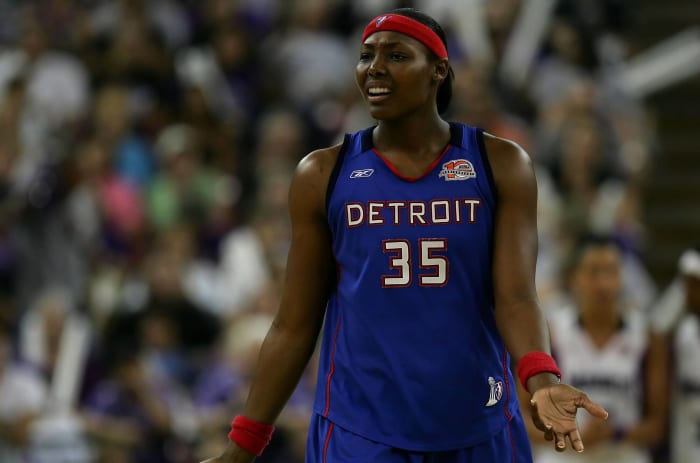
From 2003-08, the Detroit Shock were the WNBA's "It" team. The franchise won all three of its WNBA titles during that span, with this '06 squad being the second championship-winning squad. That group went 23-11 and was paced by stars Deanna Nolan and Cheryl Ford. The Shock took down reigning league champion Sacramento in a five-game Finals series. While the first four contests featured double-digit victory margins, the decisive Game 5 was much closer. In fact, Detroit needed two Katie Smith jumpers in the final two minutes for an 80-75 victory.
22. Houston Comets (1997)

Under the direction of coach Van Chancellor, the Houston Comets were the first and, depending on opinion, the only dynasty in WNBA history. The Comets won the league's first four titles (1997-2000). It's a consecutive feat that's not been duplicated, and those four championships are tied for the most in league history. In the WNBA's inaugural season, there were just eight teams, with the Comets posting a league-best 18-10 record behind 34-year-old Cynthia Cooper (22.2 ppg), the league's first superstar and MVP. They only needed two playoff games to win the title and beat Charlotte and New York by a combined 30 points.
21. Minnesota Lynx (2012)

The first of back-to-back Minnesota teams that failed to win a WNBA title but should be recognized for their overall greatness. This 2017 squad, led by Seimone Augustus (16.6 ppg), Maya Moore (16.4 ppg), and Lindsay Whalen (11.5 ppg, 5.4 apg), went a league-best 27-7 and looked primed to repeat as WNBA champs. However, it should have been a sign of things to come when the Lynx needed three games to take down Seattle in the opening playoff round. After sweeping Los Angeles, Minnesota could not shake a 12-loss Indiana squad that got hot in the playoffs and lost in four games.
20. Minnesota Lynx (2016)

In the history of Minnesota Lynx basketball, no team has posted more single-season victories than the 2016 group that went 28-6. But, even with the league's best record, WNBA Defensive Player of the Year Sylvia Fowles, fellow star Maya Moore (19.3 ppg), and a double-bye in the playoffs, the Lynx were unable to repeat as league champions. Minnesota swept Phoenix in three games, then ran into Candace Parker and the surging Los Angeles Sparks. The Lynx lost two of three to the Sparks at home in the series, including 77-76 in the decisive Game 5, when Nneka Ogwumike hit a short jumper off a rebound of her own blocked shot with 3.1 seconds left. Before her heroics, Ogwumike made a shot that appeared to come after the shot clock expired but wasn't called. Lynx coach Cheryl Reeve lashed out in her postgame presser.
19. Indiana Fever (2012)

As noted, Minnesota enjoyed a stellar regular season in 2012. However, the Fever had a pretty special group that ultimately won the franchise's first league title. Led by two of the greatest college players of all time in Tamika Catchings (17.4 ppg, 7.6 rpg) and Katie Douglas (16.5 ppg), the Fever matched a club regular-season record at 22-12. And despite losing their playoff openers versus Atlanta and Connecticut, Indiana outplayed the Lynx.
18. Seattle Storm (2004)

The Storm made their WNBA debut in 2000, and by 2004, the team had won the club's first league title. Seattle finished 20-14 during the regular season, five games back of Los Angeles in the Western Conference, and lost six of their final nine down the stretch. However, Lauren Jackson (20.4 ppg), Sue Bird (12.9 ppg, 5.4 apg), Finals MVP Betty Lennox (11.9 ppg), and the rest of the Storm found their form when it mattered most. Seattle won five of its six playoff games by double-digits. And, after falling in Game 1 of the WNBA Finals at Connecticut, it won the next two for the championship — making Anne Donovan the first female coach to claim a league title
17. Los Angeles Sparks (2016)

The most recent of Los Angeles' three WNBA titles, but it was the only one the Sparks managed to win with Candace Parker in tow. The '16 Sparks were 26-8, owning the second-best record in the regular season behind Minnesota (28-6). They finished 6-7 down the stretch, but behind league MVP Nneka Ogwumike (19.7 ppg, 9.1 rpg, 3.1 apg), Finals MVP Parker (15.3 ppg, 7.4 rpg, 4.9 apg), and Kristi Toliver (13.2 ppg), Los Angeles regrouped to beat Chicago in four games to open the playoffs. They took down the Lynx in one of the most entertaining Finals in league history.
16. Phoenix Mercury (2009)

The Mercury's five Finals appearances are tied with Minnesota for the second-most all-time appearances. Phoenix won two of its three championships between 2007-09. The second of those titles came in 2009 when the Mercury matched a franchise-best 23-11 mark and averaged 92.8 points. The latter is the second-highest single-season scoring average in league history, trailing only its own 93.9 points per game from 2010. The Mercury's 85.5 percent shooting from the free-throw line is also a league record. Diana Taurasi, who eventually became the WNBA's all-time leading scorer, averaged a league-best 20.4 points in 2009, while teammate Tangela Smith shot 45.2 percent from 3-point range. The Mercury capped their second championship season by overcoming a 2-1 hole to Indiana in the Finals.
15. Houston Comets (1999)
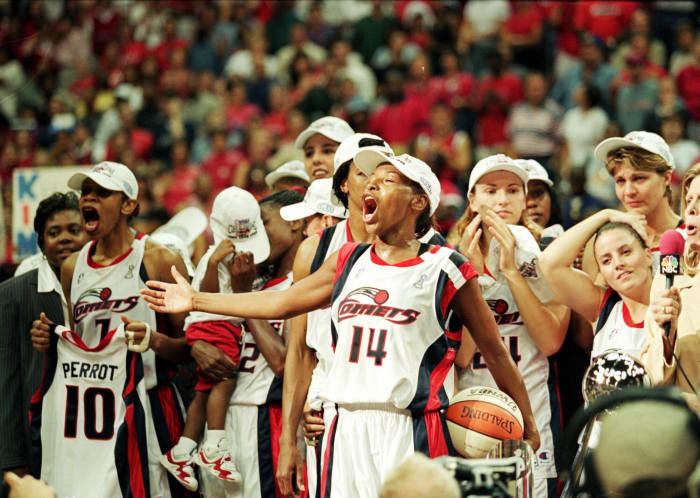
Houston's third championship-winning group was again the class of the league. The Comets went 26-6 — no other team won more than 20 games that year — and Cynthia Cooper remained the star of the league but teammates Sheryl Swoopes and Tina Thompson were also among the WNBA elite. Houston lost its playoff opener in a somewhat stunning fashion but rebounded to take the next two games versus Los Angeles. Facing New York in the Finals again, the Comets lost Game 2. But again, they regrouped to roll 59-47 in the decisive Game 3. They did so in honor of guard Kim Perrot, a key piece to Houston's first two titles, who died from lung and brain cancer in August of that year.
14. Seattle Storm (2020)

We talked about Seattle's first championship. Now, the Storm's fourth. The Storm were two years removed from winning their third league title. In 2020, amid the confines of the COVID-created "Wubble," Seattle went 18-4 during the shortened season and tied with Las Vegas for the league's best record. After earning one of the double-byes into the semifinals, and with star Breanna Stewart (19.7 ppg, 8.3 rpg. 3.6 apg) back from missing the 2019 season due to injury, the Storm swept Minnesota. Then, they beat the Aces in three Finals games to join Minnesota and Houston as the only teams to win four WNBA championships.
13. Minnesota Lynx (2011)

Making just its third playoff appearance in the first 13 years of the franchise, Minnesota brought home the WNBA title. The Lynx were far and away the league's best team in 2011, going 27-7. After being taken to the three-game limit by San Antonio in the first round of the playoffs, Minnesota swept Phoenix in the conference finals and Atlanta in the Finals. While Seimone Augustus (16,2 ppg) and Lindsay Whalen (13.6 ppg, 59 apg) were the stars, this was the WNBA's introduction to the talent of Maya Moore (13.2 ppg), who was named the league's rookie of the year.
12. Sacramento Monarchs (2005)

One of the original eight WNBA franchises, the Monarchs enjoyed a generally successful run, going 224-200 from 1997-2009. It was 2005, though, that remains the crowning jewel of the franchise's existence. Led by WNBA greats and league MVP Yolanda Griffith, Nicole Powell, Rebekkah Brunson, and Ticha Penicheiro, the Monarchs went a franchise-best 25-9. After sweeping Los Angeles and Houston, Sacramento beat Connecticut in four games to win the club's only WNBA title. Four seasons later, the franchise would fold.
11. Seattle Storm (2018)
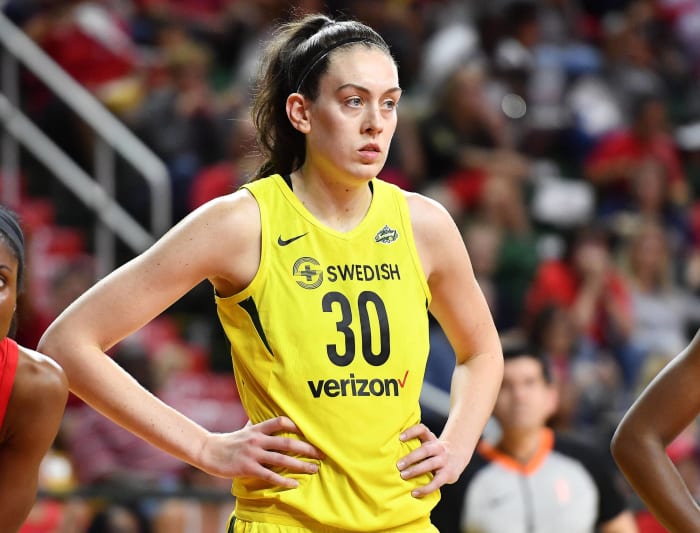
The 2018 Seattle Storm were the WNBA's best team during the regular season at 26-8. Then, the Storm backed it up by outlasting Phoenix during an entertaining five-game semifinal series and sweeping Washington in three games to capture the franchise's third title. The Storm were the only team in 2018 to suffer single-digit losses. Meanwhile, Breanna Stewart (24.6 ppg, 6.9 rpg) was named both league and Finals MVP, Natasha Howard (15.8 ppg, 8.3 rpg) won WNBA Most Improved Player, and legend Sue Bird (10.0 ppg, 6.9 apg) proved age was no obstacle.
10. Los Angeles Sparks (2002)
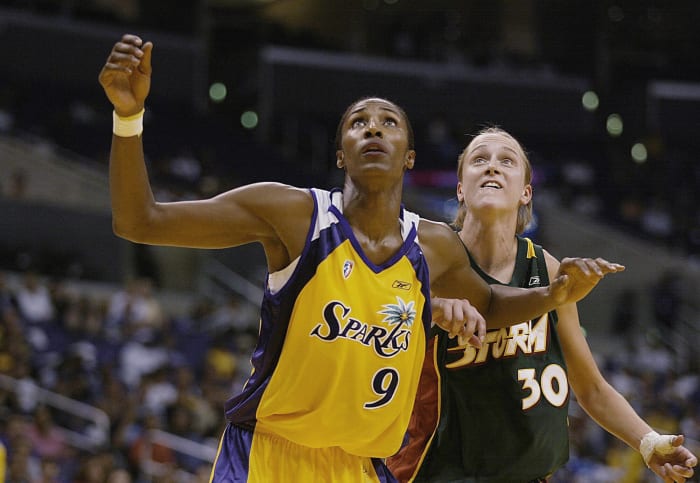
The second of Los Angeles' back-to-back WNBA titles. Under the direction of former Laker Michael Cooper, the Sparks didn't let up after winning the franchise's first title. These Sparks went 25-7 — the best record during the regular season. But it was the dominance that Finals MVP Lisa Leslie and Co. displayed during the playoffs that truly defined the greatness of this squad. The Sparks went 6-0 against Seattle, Utah, and New York during the postseason to pull off the repeat.
9. Detroit Shock (2003)

When looking back in the annals of the now-defunct Detroit Shock franchise, the performance of the 2003 squad stands out. Prior to 2003, the Houston Comets and Los Angeles Sparks combined to win the first six WNBA titles. However, the Shock ended that trend by pulling off-a-worst-to-first run to the '03 title. In 2002, led by Swin Cash (16.6 ppg, 5.8 rpg, 3.6 assists per game), Detroit went 9-23. One year later, in Motor City hoops legend Bill Laimbeer's first full season as coach, Detroit finished a league-best 25-9 and kept the Sparks from a three-peat by beating them in a three-game Finals series. Ruth Riley was named Finals MVP, while Cheryl Ford (10.8 ppg, 10.4 rpg) won WNBA Rookie of the Year.
8. Minnesota Lynx (2017)

This is Minnesota's most recent championship team. Focused on some unfinished business after falling short of the title in 2016, the Lynx went 27-4 in their follow-up and produced four All-Stars: Maya Moore, Sylvia Fowles, Seimone Augustus, Rebekkah Brunson. Overall, the group averaged 85.4 points. Fowles (18.9, 10.4 rpg) was named season and Finals MVP. After sweeping Washington, Minnesota exacted some revenge on Los Angeles by rallying from 2-1 down in the Finals.
7. Minnesota Lynx (2013)

After falling in the 2012 Finals, the Lynx roared back. At 26-8, the 2013 Minnesota squad was by far the league's best team during the regular season, winning eight of the final nine games. Then, the Lynx really turned it on during the postseason to go 7-0 against Seattle, Phoenix, and Atlanta. Only one of those playoff games was decided by three or fewer points. Finals MVP Maya Moore (18.5 ppg), Seimone Augustus (16.3 ppg), Lindsay Whalen (14.9 ppg), and Rebekkah Brunson (10.6 ppg, 8.9 rpg) shined for a club that averaged 82.9 points per game and shot 47.4 percent.
6. Washington Mystics (2019)

It only took 22 years into their WNBA existence, but the Washington Mystics finally won the league title in 2019. And this was undoubtedly the best team in franchise history. One season after winning 22 games and being swept by Seattle in the WNBA Finals, the Mystics were poised to take the next step. Behind WNBA MVP Elena Delle Donne (19.5 ppg, 8.3 rpg, 1.3 blocks per game), Washington won 17 of its final 19 regular-season games to sport a league- and franchise-best 26-8 record. The playoffs weren't as easy, with the Mystics needing three games to beat Las Vegas in the semifinals and the full five against Connecticut in the Finals to claim that elusive championship.
5. Seattle Storm (2010)

This is still the squad that all Storm teams strive to emulate. Its 28-6 record is still the best in franchise history. Paced by league and Finals MVP Lauren Jackson (20.5 ppg, 8.3 rpg), Swin Cash (13.8 ppg, 6.0 rpg), and Sue Bird (11.1 ppg, 5.8 apg), the Storm were 13 games better than second-place Phoenix in the Western Conference. Thanks to those stars, and a tremendous amount of confidence, Seattle made things look easy. Especially when the postseason rolled around. The Storm swept Los Angeles, the aforementioned Mercury, and Atlanta to conclude their 2010 dominance with the franchise's second WNBA championship.
4. Los Angeles Sparks (2001)

The Sparks' title was historic because it was the first in franchise history and ended Houston's early dynasty. Matching the franchise-best 28-4 record from 2000, these Sparks didn't have the Comets to worry about, as that franchise's dominance was fading. Backed by MVP Lisa Leslie and under the direction of coach Michael Cooper, Los Angeles posted a league-record 18-game winning streak and went undefeated at home during the regular season. In the playoffs, the Sparks officially enacted the changing of the WNBA guard by sweeping Houston in the first round. They lost a game to Sacramento in the conference finals, but the Sparks swept upstart Charlotte for the title.
3. Houston Comets (2000)

The final championship in the Comets dynasty. And once again, Houston beat the New York Liberty to claim the 2000 title. The Comets opened 19-2 and eventually won their final five regular-season games to finish 27-5 — the second-best mark in club history. They then went 6-0 during the playoffs, though their two Finals wins over the Liberty came by a combined 13 points. For the fourth time, Cynthia Cooper was named WNBA Finals MVP, but Sheryl Swoopes was honored as the league's most valuable player and defensive player of the year. After eight more seasons, the Comets franchise would fold.
2. Phoenix Mercury (2014)

Talk about dominant. Already a two-time WNBA champ, the Mercury put together one of the most special seasons in all of professional basketball. With Diana Taurasi (16.2 ppg), Brittney Griner (15.6 ppg, 8.0 rpg), and Candace Dupree (14.5 ppg, 7.6 rpg) leading the way under first-year coach Sandy Brondello, Phoenix set the WNBA's single-season record for victories while going 29-5. However, the Mercury's play during the postseason is perhaps most memorable. Phoenix went 7-1 during the playoffs, losing only to Minnesota in the conference finals. The Mercury posted an 18.3 average margin of victory during their three-game Finals sweep of the Chicago Sky.
1. Houston Comets (1998)

At 27-3, the 1998 Houston Comets still own the highest winning percentage (.900) in WNBA history. That's not the only reason why they top our list. The league had grown to 10 teams, the season was longer, and the overall talent was getting better. But that didn't matter to a Comets squad that opened 21-1. When it came time to defend their title, the Comets were part of the first-ever best-of-three Finals but lost the opener to Phoenix. However, Houston bounced back to edge the Mercury in overtime. Houston completed the repeat, again thanks to Cynthia Cooper (1998, WNBA MVP and Finals MVP), with a nine-point victory in the decisive finale.
A Chicago native, Jeff Mezydlo has professionally written about sports, entertainment and pop culture for nearly 30 years. If he could do it again, he'd attend Degrassi Junior High, Ampipe High and Grand Lakes University.
More must-reads:
- Columnist suspended following controversial Caitlin Clark interaction
- Chiefs' Rashee Rice reportedly under investigation for alleged assault
- The 'Leading scorers from the 1992-93 NBA season' quiz
Breaking News
Customize Your Newsletter
 +
+
Get the latest news and rumors, customized to your favorite sports and teams. Emailed daily. Always free!
Use of this website (including any and all parts and
components) constitutes your acceptance of these
Terms of Service and Privacy Policy.
 On Facebook
On Facebook On Flipboard
On Flipboard On Twitter
On Twitter
